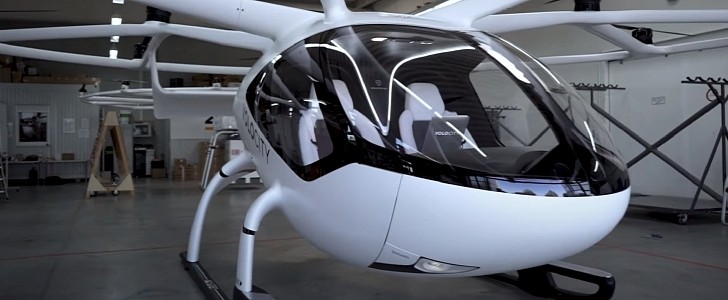German eVTOL (electric vertical take-off and landing) aircraft developer Volocopter has set out to put its VoloCity air taxi in the sky just in time for the 2024 Paris Olympics and it's doing its best to keep that promise. The company is constantly working on improving its flying machine to ensure that when the time comes, it will be able as safe and reliable as possible. To that end, Volocopter announced it expanded its cooperation with Diehl Aerospace.
The avionics and cabin integration supplier has been commissioned by Volocopter to develop and produce an optical splitter for VoloCity’s flight control system, as well as components for the battery management system.
As per the recently signed agreement, the two companies aim to upgrade the technologies in conventional airplane flight control systems by switching from the fly-by-wire approach used in aircraft such as Airbus planes to a fly-by-light technology that is supposed to be safer and offer higher performance.
The new system will replace the electrical signals sent via copper wires with light signals sent via optical fibers, to transmit measured values and control commands. The electrical signals from the flight control computer are translated into optical signals controlled optoelectronically, as explained by Diehl Aerospace.
The avionics specialist says that the fly-by-light control is immune to electromagnetic interferences such as those coming from cell phones and transmission towers. Therefore, the system would be extremely useful for the VoloCity air taxi, which plans to fly at low altitudes in cities.
Diehl Aerospace’s optical splitter will provide control information to the eVTOL’s total of eighteen rotors. An additionally-developed DCU (data concentration unit) will collect optical signals from the rotors, converting them into digital data and providing the pilot with feedback on the engine speed and temperature.
Lastly, the company will also supply components for monitoring the batteries of the VoloCity, providing the pilot with relevant info on the remaining energy and the possibility to control the power supply. Volocopter’s air taxi is equipped with nine battery packs.
The VoloCity, which should hit the market in 2024, is a two-seater that claims to offer ranges of up to 35 km (21 miles) and can fly at a top speed of 110 kph (68 mph).
As per the recently signed agreement, the two companies aim to upgrade the technologies in conventional airplane flight control systems by switching from the fly-by-wire approach used in aircraft such as Airbus planes to a fly-by-light technology that is supposed to be safer and offer higher performance.
The new system will replace the electrical signals sent via copper wires with light signals sent via optical fibers, to transmit measured values and control commands. The electrical signals from the flight control computer are translated into optical signals controlled optoelectronically, as explained by Diehl Aerospace.
The avionics specialist says that the fly-by-light control is immune to electromagnetic interferences such as those coming from cell phones and transmission towers. Therefore, the system would be extremely useful for the VoloCity air taxi, which plans to fly at low altitudes in cities.
Diehl Aerospace’s optical splitter will provide control information to the eVTOL’s total of eighteen rotors. An additionally-developed DCU (data concentration unit) will collect optical signals from the rotors, converting them into digital data and providing the pilot with feedback on the engine speed and temperature.
Lastly, the company will also supply components for monitoring the batteries of the VoloCity, providing the pilot with relevant info on the remaining energy and the possibility to control the power supply. Volocopter’s air taxi is equipped with nine battery packs.
The VoloCity, which should hit the market in 2024, is a two-seater that claims to offer ranges of up to 35 km (21 miles) and can fly at a top speed of 110 kph (68 mph).







